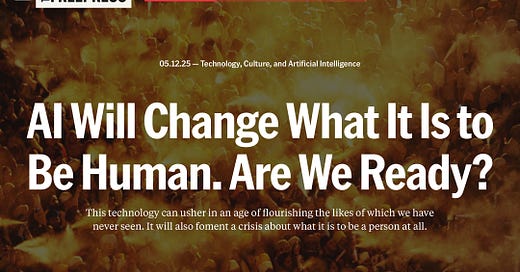AI in perspective👀
AI fear is common. Some of the fearful are well-informed; others aren’t. Fear depends on your Life Lens - what you have experienced and how those experiences affect your feelings.
Thanks to David
I received this link from David today. I am a regular listener to the Honestly podcast show hosted by Bari Weiss, founder of The FREEPRESS.
Bari self-identifies as a “lefty“. As a former journalist for The Wall Street Journal and a resident of New York City, Ms. Weiss has been schooled-well in the art of sensationalist journalism. The tone of the linked article is classic Bari Weiss journalism endorsed by a woman who admits no training in STEM subjects and who is attracted to thinkers whose “expert” opinions aligned with her feelings on the topic.
Having listened to Honestly many times, I am familiar with Bari’s world-view and the kind of perspectives that her guests bring to her show. Honestly is my go-to show when I want to understand how “lefties” view a trending topic.
My reply to David
Thanks for your message. I also see AI as a two-edged sword being thrust aggressively at humanity.
Human beings have always adapted to change, with some winners and some losers. We continually redefine ourselves as a species, have overcome many challenges over time through innovation, and we continue to thrive in spite of endless risks.
Technology has also enabled the strongest among us to exploit the weakest🥺.
Our least advantaged and victim-identifying citizens pretend to fight back politically using the ballot box as their weapon.
Elections offer futile attempts for them to control the authoritarian tendencies of the rich and powerful within governments and corporations.
It doesn’t matter is Proportional Representation of First-Past-The-Post election formats are used. The results are the same.🧐
I want AI in my corner.
Anything that I can find to leverage my defence against authoritarians is a good thing.
My alternative is to roll over and accept what the authoritarian class has in store for me.
I wrote Digital Direct Democracy- An Antidote to Digital Communism in 2023 (on Kindle). After 40 years in IT, my understanding of what technology can do, broadly speaking, is better than most. When I read The Fourth Industrial Revolution by Dr. Klaus Schwab, founder of the authoritarian World Economic Forum, I realized that he was far more tech-savvy than I could imagine for a powerful leader in his early 80s. His access to some of the richest and most powerful people on earth made me sit up and take notice.
My defence against totalitarianism.
If the authoritarian elites plan to use AI and other tools to blanket my life with their formulas for global control, I think it appropriate to “fight 🔥 with 🔥”.
I use ChatGPT, Claude.ai and GROK regularly and find them very useful assistants for my thinking and writing. I am also keenly aware of “regenerative AI” and my part in enabling it to become more powerful. As long as I have the same powerful tools available at my command as those who hope to rule me, I think I have a fighting chance to stay somewhat sovereign as an individual.
David, I appreciate your referal of this article but it does not deter my enthusiasm for these tools and for their potential to make life better for all of us if used wisely.
I can’t control how others will use it. I am only responsible for my own actions and choices and choose to 🥊 on my own terms.






AI for Good: Google AI > human doctors?
Source: ChatGPT 4o
Google has upgraded its experimental medical chatbot, AMIE, to analyze photos of rashes and interpret a variety of medical imagery, including ECGs and lab result PDFs.
AMIE (Articulate Medical Intelligence Explorer) builds on an earlier version that already beat human doctors in diagnostic accuracy and communication skills. The latest version, powered by Gemini 2.0 Flash, was unveiled in a May 6 preprint published on arXiv.
Why it matters: This represents a step closer to creating an AI medical assistant that thinks like a real doctor. By combining images with clinical data, AMIE mimics how physicians synthesize different types of information to diagnose and treat patients. It could also help mitigate major pain points in healthcare – faster triage, broader access to diagnostic support, and less risk from poor image quality or incomplete patient records.
How it works: The new AMIE model integrates Google’s previous generation of model, Gemini 2.0 Flash with medical-specific reasoning tools:
It can engage in diagnostic conversations, mimicking physician–patient exchanges.
It processes and interprets medical images, even at low quality.
It evaluates lab reports and clinical notes in real time.
It simulates peer review by role-playing all sides of a medical consultation.
To test the upgrade, researchers ran 105 medical scenarios using actors as patients. Each had a virtual consultation with both AMIE and a human doctor. Dermatologists, cardiologists, and internists reviewed the results.
AMIE consistently offered more accurate diagnoses. It also proved more resilient when presented with subpar images, a common issue in real-world telemedicine.
Big picture: With image-processing capabilities and built-in clinical logic, models like AMIE are inching toward becoming full-fledged diagnostic partners.
If you’re thinking about ditching your doctor, I wouldn’t… The tool hasn’t been peer-reviewed and remains experimental. If these results hold, it could reshape how frontline care is delivered – especially where access to human doctors is limited.